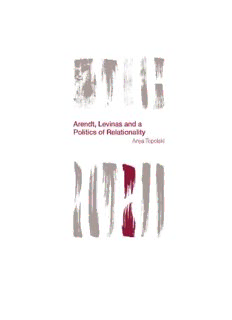
Arendt, Levinas and a Politics of Relationality PDF
Preview Arendt, Levinas and a Politics of Relationality
Arendt, Levinas and a Politics of Relationality Reframing the Boundaries: Thinking the Political Serieseditors:AlisonAssiterandEvertvanderZweerde Thisseriesaimstominetherichresourcesofphilosophersinthe ‘continental’tradition fortheircontributionstothinkingthepolitical.Itfillsagapintheliteraturebysuggesting thattheworkof a wider rangeof philosophersthanthosenormallyassociated withthis sphereofworkcanbeofrelevancetothepolitical. TitlesintheSeries KierkegaardandtheMatterofPhilosophy,MichaelO’NeillBurns Arendt,LevinasandaPoliticsofRelationality,AnyaTopolski Arendt, Levinas and a Politics of Relationality Anya Topolski London•NewYork PublishedbyRowman&LittlefieldInternational,Ltd. UnitA,WhitacreMews,26-34StannaryStreet,LondonSE114AB www.rowmaninternational.com Rowman&LittlefieldInternational,Ltd.isanaffiliateofRowman&Littlefield 4501ForbesBoulevard,Suite200,Lanham,Maryland20706,USA WithadditionalofficesinBoulder,NewYork,Toronto(Canada),andLondon(UK) www.rowman.com Copyright©2015byAnyaTopolski Allrightsreserved.Nopartofthisbookmaybereproducedinanyformorbyany electronicormechanicalmeans,includinginformationstorageandretrievalsystems, withoutwrittenpermissionfromthepublisher,exceptbyareviewerwhomayquote passagesinareview. BritishLibraryCataloguinginPublicationInformationAvailable AcataloguerecordforthisbookisavailablefromtheBritishLibrary ISBN:HB978-1-7834-8341-9 ISBN:PB978-1-7834-8342-6 LibraryofCongressCataloging-in-PublicationData Topolski,Anya,1976– Arendt,Levinasandapoliticsofrelationality/AnyaTopolski. pagescm.—(ReframingtheBoundaries) Includesbibliographicalreferencesandindex. ISBN978-1-78348-341-9(cloth:alk.paper)—ISBN978-1-78348-342-6(paper:alk.paper)— ISBN978-1-78348-343-3(electronic)1.Politicalethics.2.Politicalscience—Philosophy.3.Arendt, Hannah,1906–1975.4.Levinas,Emmanuel—Politicalandsocialviews.I.Title. JA79.T662015 172—dc23 2015005063 TMThepaperusedinthispublicationmeetstheminimumrequirementsofAmerican NationalStandardforInformationSciencesPermanenceofPaperforPrintedLibrary Materials,ANSI/NISOZ39.48-1992. PrintedintheUnitedStatesofAmerica FormydaughterHannahAliyahRahela, agiftofpurejoytakenafterjusttwoshortyearsontheearth, leavingaspaceinmyheartandintheworldnevertobefilled. Contents Acknowledgements ix Note x KeyAbbreviationsforWorksbyHannahArendtandEmmanuel Levinas xi WorksbyHannahArendt xi WorksbyEmmanuelLevinas xii Introduction:InSearchofaPoliticsofRelationality xiii Notes xviii I:BridgesandBreaks 1 1 BiographicalandPhilosophicalIntersections 3 LifeStories 5 PhilosophicalParallels 11 Notes 23 2 DividedbyDisciplinaryConfines? 27 InsurmountableTensions? 28 WhatIsthePolitical? 31 WhatIsEthics? 34 APoliticalEthics 36 Notes 37 II:OnHannahArendt 41 Notes 42 3 OnthePolitical:FromAshestoHope 43 Totalitarianism:TheLossoftheHumanWorld 44 ThePolitical:CreatingaWorldTogether 56 Plurality:ANewPrincipleforthePolitical 68 Notes 71 4 AnEthicsfromWithinthePolitical 77 TheCriterionforanArendtianEthics 78 RethinkingtheVitaContemplativainPoliticalandEthical Terms 85 vii viii Contents Responsibility:BridgingtheVitaActivaandVita Contemplativa 96 AssessingArendt’sPoliticalEthics 102 Notes 106 III:OnEmmanuelLevinas 109 Notes 110 5 Levinas’sEthics:FromOntologytoAlterity 111 FromOntologytoEthics 112 EthicsasFirstPhilosophy 116 ResponsibilityfortheOther 129 Notes 142 6 AnEthicalPolitics 145 TheCriterionforLevinas’sPolitics 146 Post-FoundationalJudaicPolitics 156 IsLevinas’sEthicalpolisEnough? 169 Notes 173 IV:FromPluralityandAlteritytoRelationality 177 7 FromArendtandLevinastoRelationality 179 IntroducingBackgroundElementsintoRelationality 181 ExperienceandthePhenomenologicalApproach 183 WrestlingwithHeidegger 184 TheJudaicContributiontoRelationality 186 FromAlterityandPluralitytoRelationality 199 Notes 211 8 ThePromiseandPitfallsofRelationality 217 Relationality:PuttingthePiecesofthePuzzleTogether 217 TowardsaPoliticsofRelationality 227 Notes 230 WorksCited 233 RelatedWorks 245 Index 259 Acknowledgements I first began researching the contents of this book in 2004. In its original formasmydoctoraldissertation,itwassuccessfullydefendedattheend of2008.Bynowitis2014,adecadehaspassed,andinthistimemuchhas changed in the shared world as well as in my own personal life. Let me tell my own story and the story of this work by interweaving them into thechangingpoliticalcontextwithinwhichtheytookplace. BornintoanonpracticingJewishfamilyofEasternEuropeandescent, myworld wasoneofsurvivorsandrefugees.Theformer thegeneration of my grandparents, the latter the generation of my parents, who were forced to leave Poland in March 1968 during a less known history of JewishpersecutionbehindtheIronCurtain.Questionsofidentity,inclu- sion and exclusion, anti-Semitism and prejudice were never foreign to my thinking, even though as a resident of Canada, they were foreign to mylivedexperience.AllthischangedwhenImovedtoEuropetostudy philosophy. Having lived in many parts of the globe, I never expected culture shock to manifest itself so strongly in the continent my parents had never ceased to speak about as our home, in terms of beings both JewsandPoles. Inpost-9/11,7/7,and11-MEurope,andmostevidentlyinthedecade in which this work has been written, there has been a resurgence of supportforpoliticians,andtheirideas,thatIwoulddefineinLevinasian terms as espousing the ‘same hatred of the other man’, a form of racism often connected to religion, race or economics. While Europeans, and certainly those caught up in the project of the European Union, talk a greatdealabouthavingfoundedaEuropethatwillneverrepeatthewars and genocide that disgrace the history of the twentieth century, what I haveobservedgreatlyconcernsme.Thegapbetweenrhetoricandreality is immense. I have seen Muslim women violently disrobed and shamed much like Jews were in the 1930s. I have seen mosques burning. These images differ only from those I have seen of synagogues burning in the 1930s because they are in colour, digital and often taken by cameras on cell phones of observers. Worst of all, I have seen too many bystanders keepwalkingandremainsilent. While there are undoubtedly many differences between the histories of Jews and Muslims in Europe, the inspiration for my dissertation and my further research is motivated by a need to signal the alarm bells. In this vein, I see a politics of relationality as a contribution towards an ix
Description: